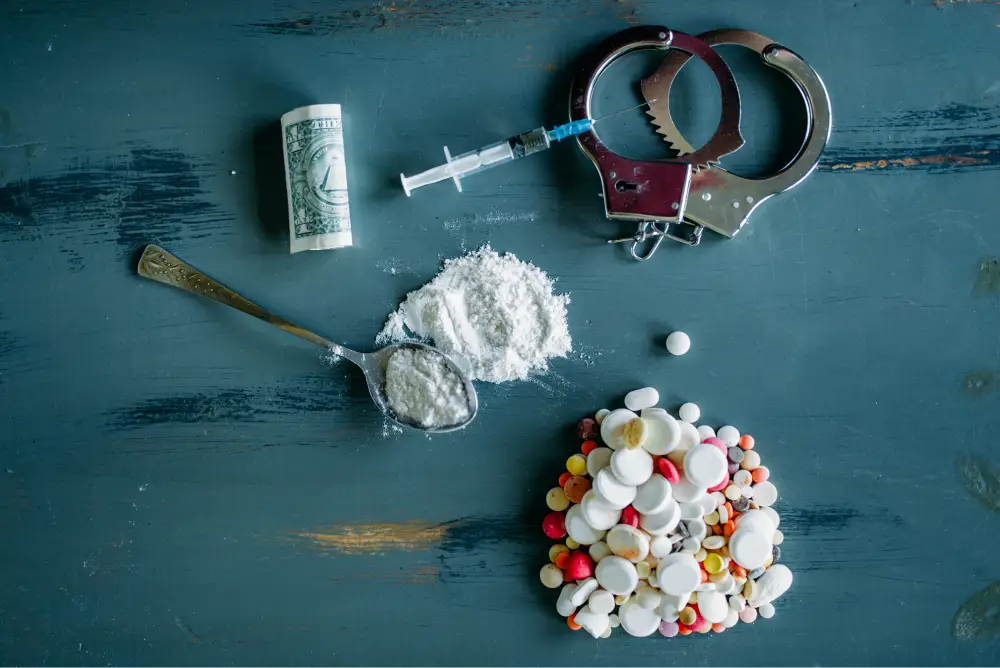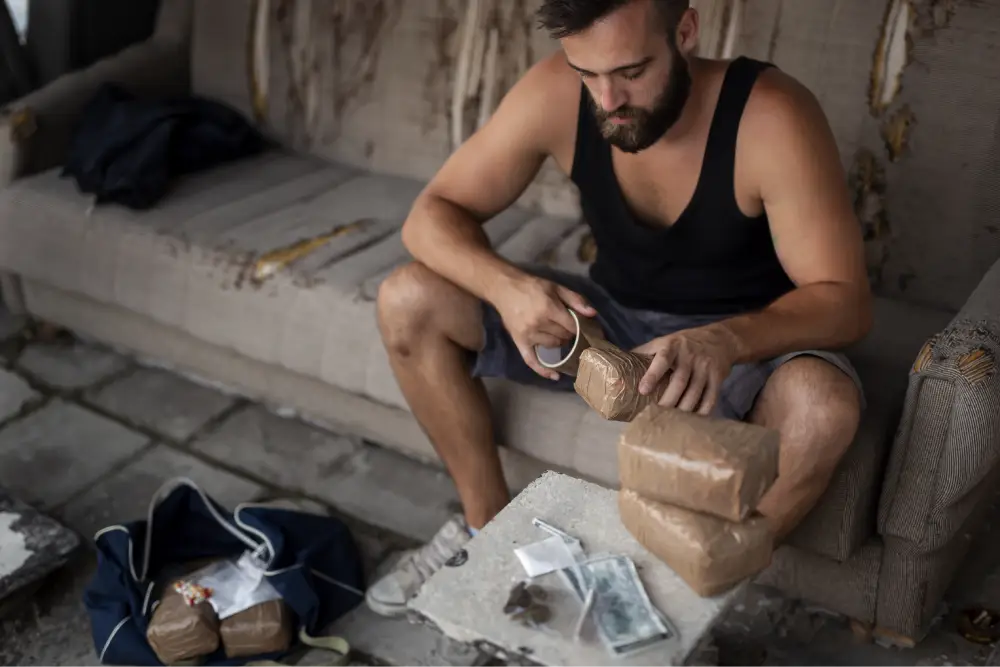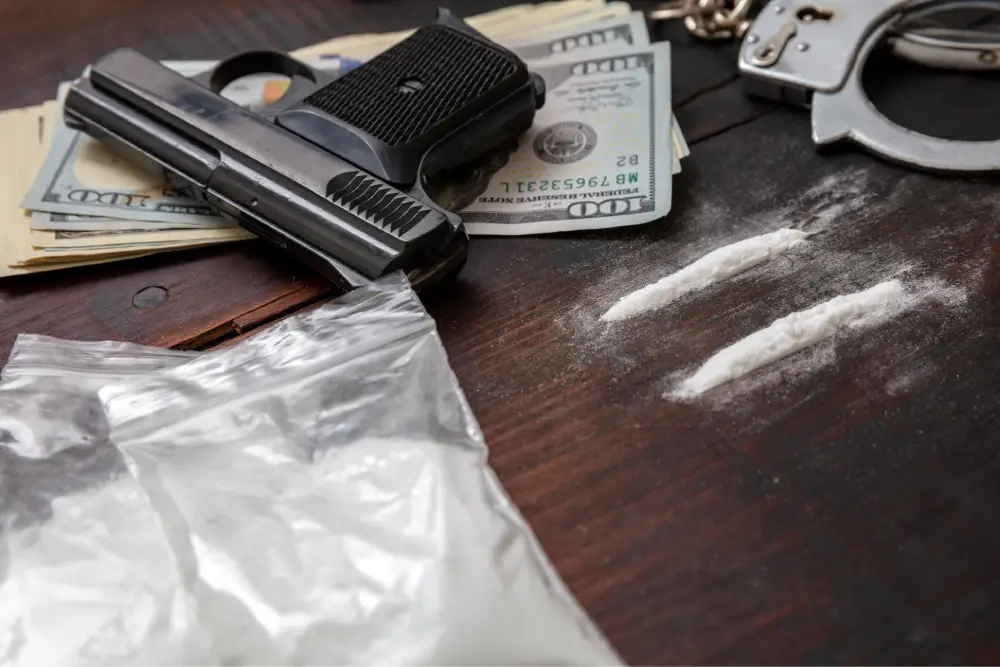Drug Trafficking in Las Vegas, North Las Vegas, and Henderson Nevada Means Facing the Toughest Charges.
One wrong step. One misunderstanding of quantity. One accusation. That’s all it takes for the vibrant energy of Las Vegas, North Las Vegas, or Henderson, Nevada, to fade into the chilling reality of a drug trafficking charge. Suddenly, your future, your freedom, your very livelihood, are on the line. This isn’t just about a “legal issue”; it’s about navigating a labyrinth where every decision, every word, holds immense weight. A drug trafficking charge in Nevada doesn’t just carry a penalty; it often carries mandatory minimum prison sentences that can reshape your life irrevocably. It demands immediate, strategic, and absolutely unyielding legal representation.
I’m Attorney Michael I. Gowdey. For over 30 years, my firm, The Law Offices of Michael I. Gowdey, LTD, has stood as a formidable bulwark for individuals caught in the unforgiving machinery of the criminal justice system here in Southern Nevada. When it comes to drug trafficking in Las Vegas, North Las Vegas, and Henderson Nevada, I’ve seen it all. I’ve witnessed how these cases are built by local and federal agencies, how they destroy lives, and, most critically, how to dismantle the prosecution’s arguments piece by meticulous piece. My expertise isn’t just theoretical; it’s forged in decades of courtroom battles, understanding the intricacies of Nevada law, and knowing the local prosecutors, judges, and federal court nuances. You deserve nothing less than a defense that is as aggressive as it is precisely calculated.


Drug Trafficking in Las Vegas, North Las Vegas, and Henderson Nevada: Facing the Toughest Charges
Whether you’re facing allegations of manufacturing, distribution, or simply possessing a quantity of a controlled substance that triggers trafficking thresholds, the stakes are incredibly high. The Nevada Revised Statutes (NRS) dealing with controlled substances are intricate, unforgiving, and packed with severe penalties. Without an experienced Las Vegas Drug Trafficking Lawyer by your side from the very beginning, you risk making critical missteps that could irreversibly jeopardize your entire defense. My unwavering commitment is to provide a defense that is zealous, knowledgeable, and precisely tailored to the unique circumstances of your drug trafficking case.
What Exactly is Drug Trafficking in Nevada?
In Nevada, drug trafficking isn’t just about selling drugs. This is a critical point. Often, it’s defined by the quantity of the controlled substance you possess. If you have more than a certain amount, even if it’s purely for personal use, the law presumes you intend to traffic it, leading to a much more severe charge than simple possession.
Nevada’s Uniform Controlled Substances Act (NRS 453.3385) is the key statute. It classifies drugs into Schedules (I to V) and sets precise weight thresholds:
● Schedule I or II Substances (e.g., Heroin, Cocaine, Methamphetamine, MDMA)
- 100 grams but less than 400 grams: Category B felony, punishable by 2 to 20 years in Nevada State Prison and fines up to $100,000.
- 400 grams or more: Category A felony, carrying a sentence of 25 years to life in prison, or 25 years with parole eligibility after 10 years, and fines up to $500,000.
Fentanyl Trafficking (NRS 453.3387)
Due to its extreme potency, fentanyl has even lower thresholds:
- 28 grams but less than 42 grams: Category B felony, 1 to 10 years in prison.
- 42 grams but less than 100 grams: Category B felony, 2 to 15 years in prison.
- 100 grams or more: Category A felony, 25 years to life in prison or 25 years with parole eligibility after 10 years, and fines up to $1,000,000. (Source: NRS 453.3385, 453.3387, 2025).
Even lower amounts can trigger “possession with intent to sell” charges, which are also very serious felonies, but the sheer quantity in trafficking cases is what really escalates the penalties.
What Are the Penalties for Drug Trafficking in Las Vegas?
The penalties for drug trafficking in Las Vegas, North Las Vegas, and Henderson Nevada are among the most severe in state criminal law. They are often defined by mandatory minimum prison sentences, meaning judges have very little discretion to impose lighter sentences once a conviction is secured.
Mandatory Prison Sentences
Unlike many other drug offenses, probation is generally not an option for trafficking convictions under NRS 453.3405, with only one very narrow exception for “substantial assistance” (cooperating with police). This means if you’re convicted, you’re almost certainly going to prison.
Life Sentences
For Category A felonies (e.g., 400 grams or more of Schedule I/II drugs), you could face a sentence of life in prison.
Exorbitant Fines
Fines can range from tens of thousands to up to $1,000,000, creating a crushing financial burden that can ruin families.
Asset Forfeiture
This is a particularly brutal consequence in trafficking cases. Law enforcement agencies can seize assets—cash, vehicles, homes, bank accounts—if they believe the property was used in or derived from drug trafficking activities. This can happen even before a conviction, through civil forfeiture proceedings. (Source: Nevada Defense Group, 2025). Recovering these assets requires aggressive legal action in separate proceedings.
Permanent Criminal Record
A felony drug trafficking conviction effectively closes doors to legitimate employment, housing, professional licenses, and can have severe immigration consequences, including deportation for non-citizens.
In 2023, there was a 10% rise in drug-related crimes in Las Vegas, with increased efforts by the Las Vegas Metropolitan Police Department (LVMPD) to disrupt drug activity. (Source: Liberators Criminal Defense, 2024). This vigilance means more people are facing these severe charges.
How Do Law Enforcement Agencies Investigate and Prove Drug Trafficking?
Law enforcement agencies, from local narcotics units in Las Vegas, North Las Vegas, and Henderson to federal agencies like the DEA and FBI, employ sophisticated and often aggressive tactics to investigate and prove drug trafficking charges. My three decades of experience mean I’m intimately familiar with these methods.
Common investigation methods include:
Undercover Operations & Confidential Informants
Police often use undercover officers or informants to make “controlled buys” of drugs, gather evidence, and identify larger distribution networks. The credibility of these informants and the legality of the police’s actions are often key defense points.
Surveillance
Physical surveillance, electronic surveillance (including wiretaps, especially in federal cases), and tracking devices are used to monitor suspects’ movements and communications.
Controlled Deliveries
If a package containing drugs is intercepted (e.g., by postal services), law enforcement may conduct a controlled delivery to identify the recipient.
Search Warrants
Based on probable cause, warrants are obtained for homes, vehicles, businesses, and digital devices (phones, computers) to seize drugs, paraphernalia, and evidence of distribution.
Asset Forfeiture Investigations
Parallel investigations are often launched to identify and seize assets believed to be connected to drug trafficking.
Interagency Task Forces
Local police departments often work in conjunction with state (e.g., Nevada DPS Investigation Division) and federal agencies in multi-jurisdictional drug task forces, pooling resources and expanding investigative reach. (Source: Nevada DPS, 2025).
What Defenses Work Against Drug Trafficking Charges in Nevada?
Facing these severe charges requires a defense attorney who is not afraid to challenge every aspect of the prosecution’s case. My approach as a Las Vegas Drug Trafficking Lawyer is to meticulously scrutinize the evidence and police conduct, building a robust defense.
Common defense strategies for drug trafficking in Las Vegas, North Las Vegas, and Henderson Nevada include:
Illegal Search and Seizure (Fourth Amendment Violation)
This is paramount in drug cases. If drugs or evidence were obtained through an unlawful traffic stop, a warrantless search, an invalid warrant, or exceeding a warrant’s scope, that evidence can be suppressed. If the drugs are suppressed, the prosecution’s case often collapses. I have successfully argued motions to suppress countless times.
Lack of Knowledge or Possession
Arguing that you genuinely didn’t know the drugs were present, or that you lacked actual or constructive control over them. This is especially relevant in cases involving shared vehicles, residences, or large shipments where you might be unaware of the illegal contents.
Entrapment
Proving that law enforcement officers or their agents improperly induced you to commit a crime you were not predisposed to commit. Police are allowed to offer opportunities, but they cannot create the criminal intent.
Challenging Drug Weight or Identity
Forensic lab errors, contamination of samples, or misidentification of the substance can lead to charges based on incorrect evidence. The exact weight of the drug is crucial for determining the charge’s severity.
Challenging Informant Credibility
Many cases rely heavily on confidential informants. Their credibility can be challenged due to motives to lie (e.g., to get a lighter sentence themselves).
Alibi
Proving that you were somewhere else when the alleged crime occurred.
Chain of Custody Issues
Demonstrating that the evidence was not properly handled, stored, or accounted for from the point of seizure to the courtroom, potentially compromising its integrity.

Are There Alternatives to Prison for : Drug Trafficking in Las Vegas?
For drug trafficking in Las Vegas, North Las Vegas, and Henderson Nevada, avoiding prison is exceptionally challenging, as mandatory minimum sentences often apply. Probation is generally not an option under Nevada law for these offenses.
However, there is one narrow statutory exception (NRS 453.3405(2)) that allows for a suspended sentence or probation if the defendant provides “substantial assistance” to law enforcement in the investigation or prosecution of any other offense. This means cooperating as an informant. This is a complex and risky decision that must be weighed carefully with experienced legal counsel.
Beyond this, a skilled Las Vegas Drug Trafficking Lawyer like myself will explore:
- Plea Bargaining: Negotiating with prosecutors to have the trafficking charge reduced to a lesser, probation-eligible offense (e.g., a “possession with intent to sell” charge, or even simple possession). This is a primary strategy to avoid mandatory prison time.
- Challenging Evidence: As discussed above, successfully suppressing evidence or raising enough doubt can lead to charges being dismissed, or significantly reduced, which is the best way to avoid severe penalties.
Why You Need Michael I. Gowdey: An Experienced Las Vegas Drug Trafficking Lawyer Immediately
The moment you are implicated in drug trafficking in Las Vegas, North Las Vegas, or Henderson Nevada, your future is on the precipice. Every second counts. These cases are aggressively prosecuted by well-funded state and federal agencies.
Protecting Your Rights
I ensure your constitutional rights—your right to remain silent, your right to an attorney, your protection against unlawful searches—are protected from the very first moment. High-level trafficking cases almost always involve complex search and seizure issues, wiretaps, or informant use where early legal intervention is absolutely critical. Do not speak to the police without counsel!
Immediate Investigation & Strategic Planning
My team can launch an independent investigation immediately, meticulously gathering evidence, interviewing witnesses, and planning your defense.
Navigating the Complex System
The Nevada and federal criminal justice systems are daunting. As your Las Vegas Drug Trafficking Lawyer, I guide you through every step, explaining complex laws, court procedures, plea options, and your rights clearly and compassionately.
Proven Courtroom Advocacy
With over 30 years of dedicated criminal defense experience here in Las Vegas, I have deep familiarity with local, state, and federal courts. I know how to navigate the specific tactics prosecutors use and the tendencies of judges and juries. My track record in aggressive courtroom advocacy provides a crucial advantage. Early legal representation in serious criminal cases can dramatically improve outcomes; studies show it can reduce the likelihood of conviction and incarceration by over 50% in certain circumstances compared to self-representation. (Source: American Bar Association, 2024).
When your freedom, your assets, and your future are on the line due to drug trafficking charges in Las Vegas, North Las Vegas, or Henderson Nevada, you need a defender who has seen it all, knows how to fight aggressively, and possesses an unwavering commitment to your best interests. My firm, The Law Office of Michael I. Gowdey, LTD, is ready to provide the powerful, knowledgeable, and strategic defense you truly deserve. Your freedom is my priority.
FAQS
Top 10 Questions About Facing Drug Trafficking Charges in Las Vegas
1. What exactly is "drug trafficking" in Nevada?
Answer: In Nevada, drug trafficking isn’t just about selling. It’s often defined by the quantity of controlled substances you possess, even for personal use. Nevada law sets specific weight thresholds; exceeding these amounts can lead to trafficking charges, presuming intent to distribute or sell, resulting in far more severe penalties than simple possession.
2. How serious are drug trafficking charges in Las Vegas?
Answer: Extremely serious. These are major felonies (Category B or A) with mandatory minimum prison sentences and massive fines. For instance, possessing 100 grams of cocaine can lead to 2-20 years. For 400 grams, it’s 25 years to life. There is no probation allowed for trafficking convictions in Nevada.
3. Can I get probation for a drug trafficking conviction in Nevada?
Answer: Generally, no. Nevada law (NRS 453.3405(2)) prohibits judges from granting probation for drug trafficking convictions. If convicted, a prison sentence is mandatory. The only narrow exception is if you provide “substantial assistance” to law enforcement in prosecuting other offenses, which is a risky and complex path.
4. What kinds of drugs are typically involved in trafficking cases?
Answer: Trafficking charges most commonly involve Schedule I and II controlled substances due to their high potential for abuse. This includes drugs like methamphetamine, cocaine, heroin, MDMA, and increasingly, fentanyl. Even prescription drugs like oxycodone can lead to trafficking charges if possessed in large quantities without a valid prescription.
5. What evidence do police use to prove drug trafficking?
Answer: Police use various types of evidence, including large quantities of drugs or cash, scales, packaging materials, ledgers, text messages/phone calls, and witness testimony from informants or undercover officers. They also rely on surveillance, wiretaps, and evidence from financial transactions or asset forfeiture investigations.
6. Can I be charged with trafficking if I wasn't selling drugs?
Answer: Yes, absolutely. Nevada law defines trafficking primarily by the weight of the drug. If you possess a quantity that meets or exceeds the legal trafficking threshold, the law presumes you intend to traffic it, even if you never sold a single gram. Your intent for personal use is irrelevant to the charge itself at that point.
7. What if the drugs were found during an illegal search or traffic stop?
Answer: If drugs or evidence were obtained through an illegal search and seizure (a violation of your Fourth Amendment rights), that evidence can be suppressed (thrown out of court). This is a powerful defense. My firm meticulously scrutinizes all police conduct, including traffic stops and warrant execution, for any constitutional violations.
8. Are drug trafficking charges handled by state or federal courts?
Answer: They can be handled by both. State charges are common for local arrests. However, large-scale operations, those crossing state lines, or cases involving specific federal agencies (like the DEA or FBI) often lead to federal charges. Federal courts typically have harsher mandatory minimum sentences and stricter guidelines.
9. What is "asset forfeiture" in drug trafficking cases?
Answer: Asset forfeiture allows law enforcement to seize property (cash, vehicles, homes, bank accounts) if they believe it was used in or derived from drug trafficking activities. This can happen even before a conviction. Recovering seized assets requires separate, aggressive legal action.
10. Can a lawyer negotiate a lesser charge or an alternative sentence for drug trafficking?
Answer: It’s exceptionally challenging, as most trafficking charges carry mandatory prison. However, a skilled lawyer can pursue strategies like challenging evidence for dismissal or acquittal, or, in rare cases, negotiating a plea to a lesser, probation-eligible charge. The “substantial assistance” exception is another highly risky, narrow path to avoid prison.
